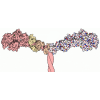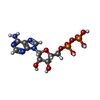+ Open data
Open data
- Basic information
Basic information
| Entry | Database: PDB / ID: 8dmy | ||||||
|---|---|---|---|---|---|---|---|
| Title | Cryo-EM structure of cardiac muscle alpha-actin | ||||||
 Components Components | Actin, alpha cardiac muscle 1 | ||||||
 Keywords Keywords | STRUCTURAL PROTEIN / cytoskeleton | ||||||
| Function / homology |  Function and homology information Function and homology informationStriated Muscle Contraction / RHOA GTPase cycle / actin-myosin filament sliding / heart contraction / myosin binding / mesenchyme migration / actin filament organization / sarcomere / actin filament / filopodium ...Striated Muscle Contraction / RHOA GTPase cycle / actin-myosin filament sliding / heart contraction / myosin binding / mesenchyme migration / actin filament organization / sarcomere / actin filament / filopodium / Hydrolases; Acting on acid anhydrides; Acting on acid anhydrides to facilitate cellular and subcellular movement / lamellipodium / cell body / hydrolase activity / positive regulation of gene expression / ATP binding / cytoplasm Similarity search - Function | ||||||
| Biological species |  | ||||||
| Method | ELECTRON MICROSCOPY / single particle reconstruction / cryo EM / Resolution: 3.07 Å | ||||||
 Authors Authors | Arora, A.S. / Huang, H.L. / Heissler, S.M. / Chinthalapudi, K. | ||||||
| Funding support |  United States, 1items United States, 1items
| ||||||
 Citation Citation |  Journal: Elife / Year: 2023 Journal: Elife / Year: 2023Title: Structural insights into actin isoforms. Authors: Amandeep S Arora / Hsiang-Ling Huang / Ramanpreet Singh / Yoshie Narui / Andrejus Suchenko / Tomoyuki Hatano / Sarah M Heissler / Mohan K Balasubramanian / Krishna Chinthalapudi /   Abstract: Actin isoforms organize into distinct networks that are essential for the normal function of eukaryotic cells. Despite a high level of sequence and structure conservation, subtle differences in their ...Actin isoforms organize into distinct networks that are essential for the normal function of eukaryotic cells. Despite a high level of sequence and structure conservation, subtle differences in their design principles determine the interaction with myosin motors and actin-binding proteins. Therefore, identifying how the structure of actin isoforms relates to function is important for our understanding of normal cytoskeletal physiology. Here, we report the high-resolution structures of filamentous skeletal muscle α-actin (3.37 Å), cardiac muscle α-actin (3.07 Å), ß-actin (2.99 Å), and γ-actin (3.38 Å) in the Mg·ADP state with their native post-translational modifications. The structures revealed isoform-specific conformations of the N-terminus that shift closer to the filament surface upon myosin binding, thereby establishing isoform-specific interfaces. Collectively, the structures of single-isotype, post-translationally modified bare skeletal muscle α-actin, cardiac muscle α-actin, ß-actin, and γ-actin reveal general principles, similarities, and differences between isoforms. They complement the repertoire of known actin structures and allow for a comprehensive understanding of in vitro and in vivo functions of actin isoforms. | ||||||
| History |
|
- Structure visualization
Structure visualization
| Structure viewer | Molecule:  Molmil Molmil Jmol/JSmol Jmol/JSmol |
|---|
- Downloads & links
Downloads & links
- Download
Download
| PDBx/mmCIF format |  8dmy.cif.gz 8dmy.cif.gz | 288.4 KB | Display |  PDBx/mmCIF format PDBx/mmCIF format |
|---|---|---|---|---|
| PDB format |  pdb8dmy.ent.gz pdb8dmy.ent.gz | 237.5 KB | Display |  PDB format PDB format |
| PDBx/mmJSON format |  8dmy.json.gz 8dmy.json.gz | Tree view |  PDBx/mmJSON format PDBx/mmJSON format | |
| Others |  Other downloads Other downloads |
-Validation report
| Summary document |  8dmy_validation.pdf.gz 8dmy_validation.pdf.gz | 1.6 MB | Display |  wwPDB validaton report wwPDB validaton report |
|---|---|---|---|---|
| Full document |  8dmy_full_validation.pdf.gz 8dmy_full_validation.pdf.gz | 1.6 MB | Display | |
| Data in XML |  8dmy_validation.xml.gz 8dmy_validation.xml.gz | 54.4 KB | Display | |
| Data in CIF |  8dmy_validation.cif.gz 8dmy_validation.cif.gz | 78.3 KB | Display | |
| Arichive directory |  https://data.pdbj.org/pub/pdb/validation_reports/dm/8dmy https://data.pdbj.org/pub/pdb/validation_reports/dm/8dmy ftp://data.pdbj.org/pub/pdb/validation_reports/dm/8dmy ftp://data.pdbj.org/pub/pdb/validation_reports/dm/8dmy | HTTPS FTP |
-Related structure data
| Related structure data |  27549MC 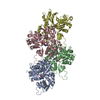 8dmxC 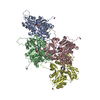 8dnfC 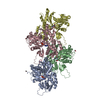 8dnhC M: map data used to model this data C: citing same article ( |
|---|---|
| Similar structure data | Similarity search - Function & homology  F&H Search F&H Search |
- Links
Links
- Assembly
Assembly
| Deposited unit | 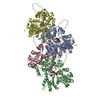
|
|---|---|
| 1 |
|
- Components
Components
| #1: Protein | Mass: 41728.480 Da / Num. of mol.: 4 / Source method: isolated from a natural source / Source: (natural)  References: UniProt: Q3ZC07, Hydrolases; Acting on acid anhydrides; Acting on acid anhydrides to facilitate cellular and subcellular movement #2: Chemical | ChemComp-ADP / #3: Chemical | ChemComp-MG / Has ligand of interest | N | |
|---|
-Experimental details
-Experiment
| Experiment | Method: ELECTRON MICROSCOPY |
|---|---|
| EM experiment | Aggregation state: FILAMENT / 3D reconstruction method: single particle reconstruction |
- Sample preparation
Sample preparation
| Component | Name: cardiac alpha actin / Type: ORGANELLE OR CELLULAR COMPONENT Details: Cardiac actin extracted and purified from bovine heart Entity ID: #1 / Source: NATURAL |
|---|---|
| Molecular weight | Experimental value: NO |
| Source (natural) | Organism:  |
| Buffer solution | pH: 7 |
| Specimen | Embedding applied: NO / Shadowing applied: NO / Staining applied: NO / Vitrification applied: YES |
| Specimen support | Grid material: GOLD / Grid type: C-flat |
| Vitrification | Instrument: LEICA EM GP / Cryogen name: ETHANE / Humidity: 95 % / Chamber temperature: 298 K |
- Electron microscopy imaging
Electron microscopy imaging
| Experimental equipment |  Model: Titan Krios / Image courtesy: FEI Company |
|---|---|
| Microscopy | Model: FEI TITAN KRIOS |
| Electron gun | Electron source:  FIELD EMISSION GUN / Accelerating voltage: 300 kV / Illumination mode: OTHER FIELD EMISSION GUN / Accelerating voltage: 300 kV / Illumination mode: OTHER |
| Electron lens | Mode: BRIGHT FIELD / Nominal magnification: 81000 X / Nominal defocus max: 1500 nm / Nominal defocus min: 200 nm / Alignment procedure: ZEMLIN TABLEAU |
| Specimen holder | Cryogen: NITROGEN / Specimen holder model: FEI TITAN KRIOS AUTOGRID HOLDER |
| Image recording | Electron dose: 60 e/Å2 / Film or detector model: GATAN K3 BIOQUANTUM (6k x 4k) / Num. of grids imaged: 1 / Num. of real images: 1444 |
| EM imaging optics | Energyfilter name: GIF Bioquantum / Energyfilter slit width: 20 eV / Spherical aberration corrector: Cs-corrected microscope |
- Processing
Processing
| Software | Name: PHENIX / Version: 1.20.1_4487: / Classification: refinement | |||||||||||||||||||||||||||||||||
|---|---|---|---|---|---|---|---|---|---|---|---|---|---|---|---|---|---|---|---|---|---|---|---|---|---|---|---|---|---|---|---|---|---|---|
| EM software |
| |||||||||||||||||||||||||||||||||
| CTF correction | Type: PHASE FLIPPING AND AMPLITUDE CORRECTION | |||||||||||||||||||||||||||||||||
| Particle selection | Details: Single Particle | |||||||||||||||||||||||||||||||||
| Symmetry | Point symmetry: C1 (asymmetric) | |||||||||||||||||||||||||||||||||
| 3D reconstruction | Resolution: 3.07 Å / Resolution method: FSC 0.143 CUT-OFF / Num. of particles: 657041 / Symmetry type: POINT | |||||||||||||||||||||||||||||||||
| Atomic model building | B value: 117 / Protocol: FLEXIBLE FIT / Space: REAL | |||||||||||||||||||||||||||||||||
| Atomic model building | PDB-ID: 6DJO Pdb chain-ID: A | |||||||||||||||||||||||||||||||||
| Refine LS restraints |
|
 Movie
Movie Controller
Controller






 PDBj
PDBj
